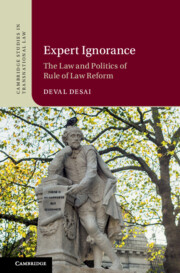Today, the rule of law is axiomatically central to global governance. Yet the rule of law is more radically contested than ever before. This book studies the theory and practice of rule of law reform in this context to tackle three questions:
Through what theories and methods can we understand rule of law reform (and perhaps expert ignorance more generally)? Rule of law reformers can, and often do, deny the form and content of their own expertise. In doing so, they collapse or make fragile a relationship between knowledge and action that other experts strive to produce and stabilise. This means that rule of law reformers’ policies, projects, and practices are often more underdetermined than might otherwise be assumed (for example, through interpretive social science methods). Studying rule of law reform requires a theoretical and methodological apparatus that can make expert self-denial visible and analysable, without doing so from a position of superior knowledge – for to do so would entail a claim that the scholar knows what the rule of law is, even as the reformer denies that possibility, thereby artificially limiting what is to be analysed. I then draw on aesthetic theory and performance studies to see and study expert self-denial – or expert ignorance – as it unfolds in rule of law reform. I conclude by suggesting that expert ignorance might be identified, studied, and evaluated in other domains of global governance that pursue institution-building projects.
If rule of law reform emerges from reformers’ efforts to radically critique their own and others’ ideas, how does it work? And with what legal and political effects? This argument is concerned with the operationalisation of expert ignorance, through the workings of rule of law reform. Rule of law reform consists of reformers’ embodied efforts to remain open to reinterpreting the rule of law, even as they perform concrete moments of expert action, from programme implementation to indicator development. Their efforts entail ‘implementation work’ – well-established ways of taking expert action, like conducting research – and ‘ignorance work’ – or efforts to radically undermine or collapse the possibility of taking action. This book shows the importance of attending to different types of ignorance work, and how they relate to different types of implementation work. Next, understanding rule of law reform as a radically open-ended embodied practice, I argue that rule of law reform should be understood as dramatic ‘action’, entailing the accumulation of embodied implementation and ignorance work over time. This work makes the space of reform, its temporality, and the identities of its participants, highly fluid and reconfigurable. Its consequence: the ‘rule of law’ emerges as a provisional and contingent phenomenon, marked by the continual return to and reworking of first-order issues such as the nature and location of law’s autonomy from politics.
What are the political stakes of rule of law reform for development practice or expert governance more broadly? This argument is concerned with the social organisation of expert ignorance. Describing rule of law reform in terms of the dramatic structure of its action turns it into a phenomenon capable of sociological analysis. In particular, I argue that rule of law reform might be studied in terms of the social limits placed on its reconfigurability. I focus on efforts to professionalise expert ignorance; they shape the dramatic action of reform by trying to predetermine what sort of implementation and ignorance work the reformer undertakes, thereby affecting the legal and political consequences that reformers produce. They also shape rule of law reformers’ relationship to other expert domains (like development economics) – with potentially depoliticising effects.

